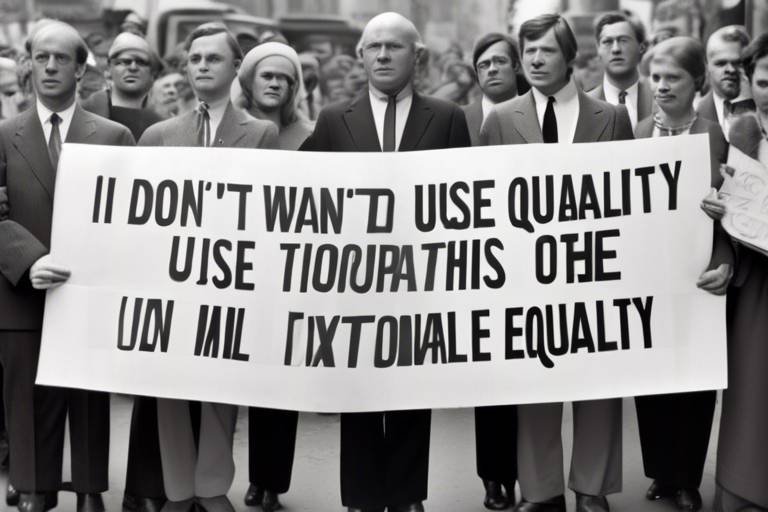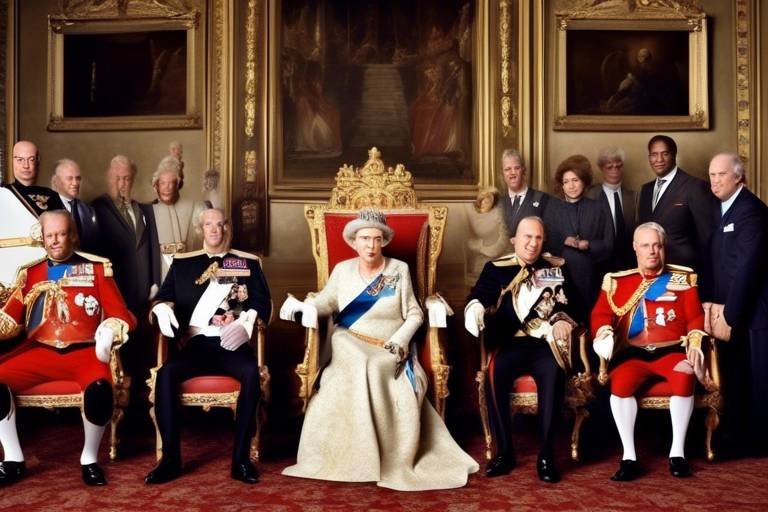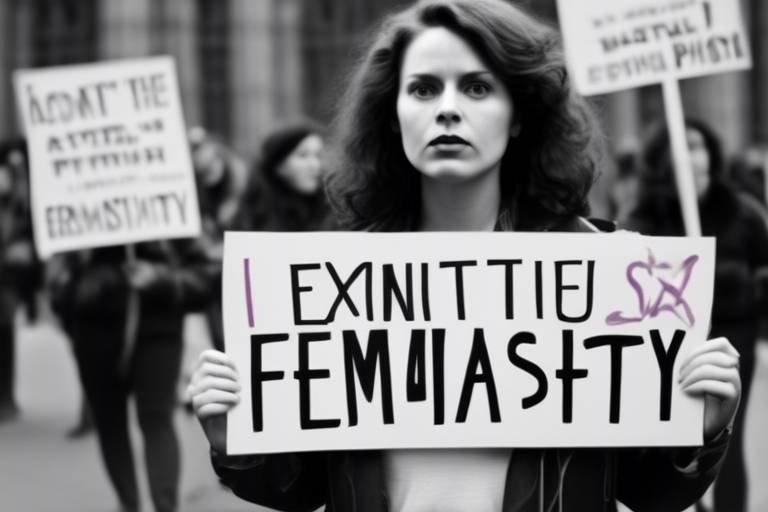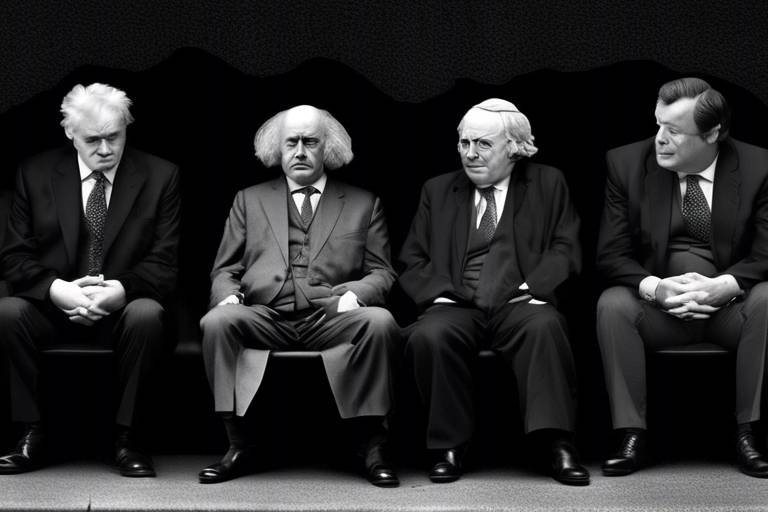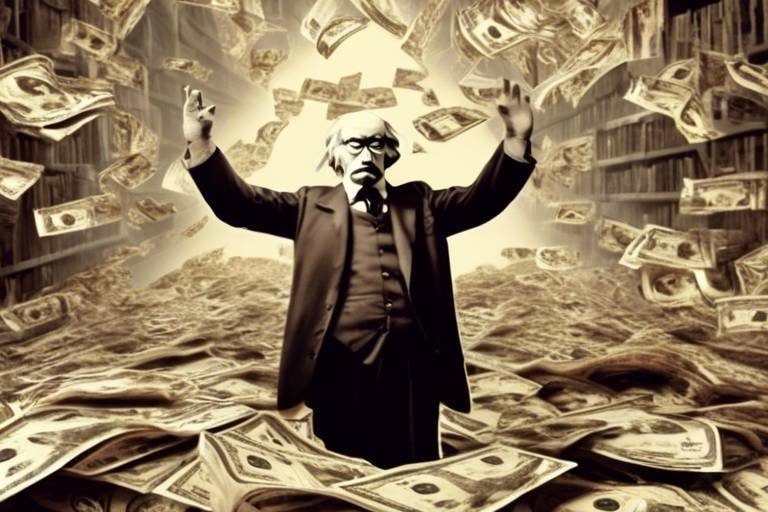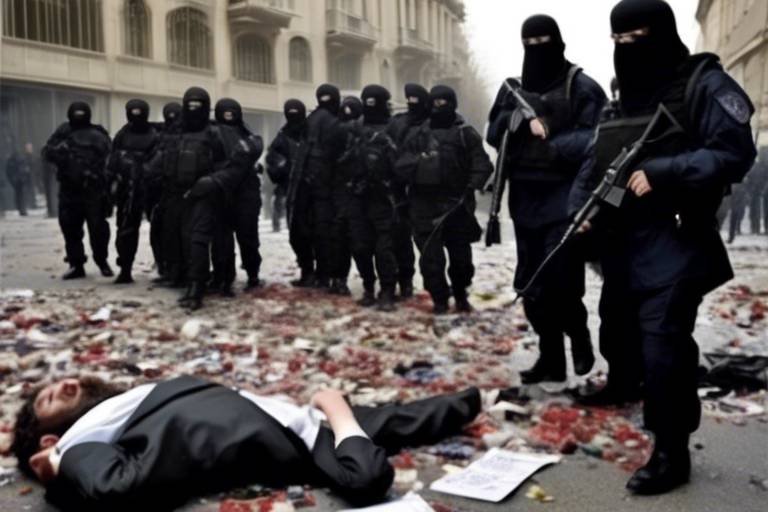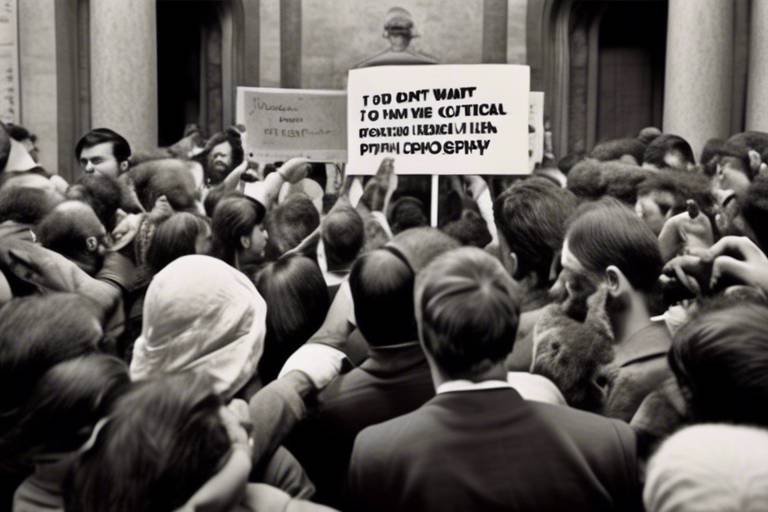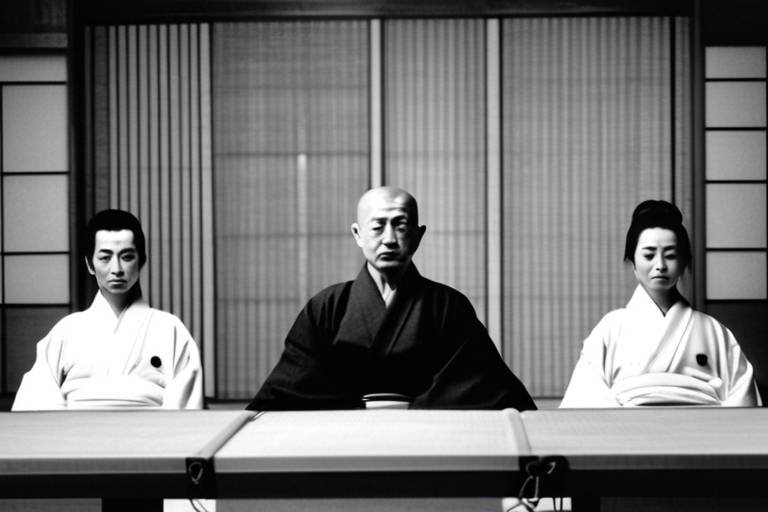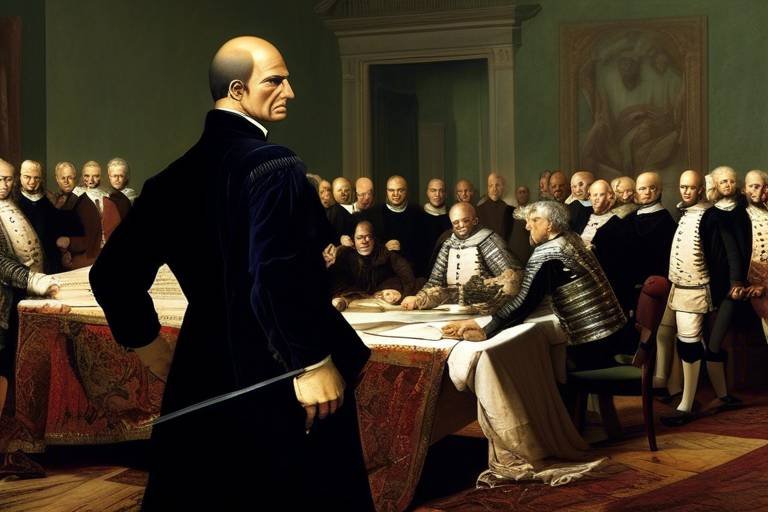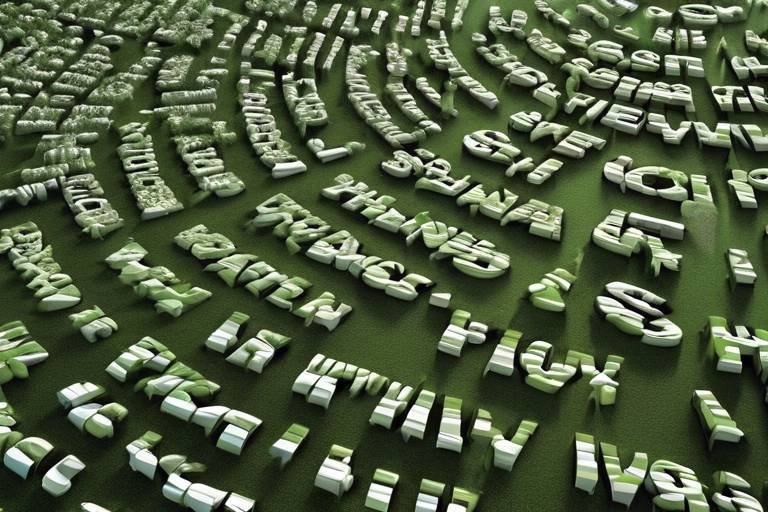Political Equality: A Rationale from Philosophical Theories
Political equality is a cornerstone of democratic societies, serving as a guiding principle that underscores the inherent value of each individual in the political sphere. At its core, political equality suggests that every person should have an equal say in the decisions that affect their lives, regardless of their background, wealth, or social status. This concept is not merely a theoretical ideal; it is a fundamental right that fuels the engines of democracy. But how did we arrive at this understanding? What philosophical theories have shaped our perception of political equality over the centuries?
To unravel these questions, we must journey through history and explore the philosophical ideas that have influenced our current understanding of political equality. From the early democratic practices of ancient Greece to the revolutionary ideas that sparked modern democratic movements, the evolution of political equality is rich and complex. It reflects not only the changing dynamics of power but also the persistent struggles for recognition and representation among marginalized groups.
As we delve deeper, we encounter influential thinkers like John Rawls and Robert Nozick, whose contrasting views provide a robust framework for understanding political equality. Rawls, with his emphasis on fairness and justice, presents a vision where societal structures are designed to uplift the least advantaged. In contrast, Nozick champions individual rights and minimal state intervention, arguing that true political equality is rooted in personal freedom and property rights. Their philosophical debates illuminate the ongoing tensions within the discourse on political equality, prompting us to consider the implications of their theories in today’s political landscape.
As we navigate through the contemporary challenges of political equality, such as voter suppression and economic disparities, it becomes clear that the fight for equitable representation is far from over. The principles laid out by these philosophers continue to resonate, urging us to reflect on our responsibilities as citizens and the systems we uphold. In a world where political influence often correlates with wealth, the quest for genuine political equality remains a pressing concern that demands our attention and action.
In the following sections, we will explore historical perspectives on political equality, delve into the philosophical foundations established by Rawls and Nozick, and examine contemporary debates surrounding voter rights and economic inequality. By doing so, we aim to paint a comprehensive picture of political equality—one that acknowledges its historical roots, philosophical debates, and the ongoing struggles that shape our democratic ideals.
- What is political equality?
Political equality refers to the idea that every individual has the same political rights and opportunities to participate in the political process. - Why is political equality important?
It is crucial for ensuring that all voices are heard in a democracy, leading to fair representation and justice in governance. - How do Rawls and Nozick differ in their views on political equality?
Rawls advocates for structures that support the least advantaged, while Nozick emphasizes individual rights and minimal government intervention. - What are some contemporary issues related to political equality?
Current challenges include voter suppression, systemic racism, and economic inequalities that affect political representation.

Historical Perspectives on Political Equality
To truly grasp the essence of political equality, we must embark on a journey through time, exploring the pivotal moments and philosophical ideas that have shaped our understanding of this concept. The roots of political equality can be traced back to ancient civilizations, where ideas about governance, citizenship, and rights began to take form. In ancient Greece, for instance, the concept of democracy emerged, albeit in a limited capacity, as only free male citizens were granted a voice in political matters. This exclusion of women, slaves, and non-citizens highlights the initial complexities surrounding political equality.
As we move through history, the Enlightenment period serves as a critical turning point. Thinkers like John Locke and Jean-Jacques Rousseau began advocating for the idea that all individuals possess inherent rights, which laid the groundwork for modern democratic thought. Locke's social contract theory emphasized that governments derive their power from the consent of the governed, suggesting that political equality is fundamental to legitimate authority. Rousseau, on the other hand, introduced the idea of the "general will," arguing that true freedom can only be achieved when individuals participate equally in the political sphere.
Fast forward to the American Revolution and the French Revolution, where the cries for liberty and equality resonated across the globe. The Declaration of Independence proclaimed that "all men are created equal," although the reality of this statement was far from inclusive. The struggle for political equality continued as marginalized groups, including women and people of color, fought for their rights. The suffragette movement in the late 19th and early 20th centuries exemplifies this ongoing battle, as women demanded the right to vote, asserting their place in the political landscape.
In the 20th century, the civil rights movement in the United States further underscored the importance of political equality. Activists like Martin Luther King Jr. championed the cause, highlighting the systemic inequalities that prevented African Americans from enjoying the same political rights as their white counterparts. This era demonstrated that political equality is not merely about formal rights but also about ensuring that all voices are heard and represented in governance.
Today, the historical perspectives on political equality remind us that while significant progress has been made, the journey is far from over. The evolution of this concept reflects the ongoing struggle against oppression and the quest for a more just society. As we analyze contemporary issues, we must remember the lessons of history and strive to create a political landscape where everyone, regardless of their background, can participate equally.
- What is political equality? Political equality refers to the principle that all individuals should have equal access to political participation and representation, regardless of their background or status.
- Why is historical perspective important for understanding political equality? Understanding the historical context of political equality helps us recognize the struggles and advancements made over time, informing current debates and policies.
- How does political equality relate to social justice? Political equality is a fundamental aspect of social justice, as it ensures that all individuals have a voice in decision-making processes that affect their lives.

Philosophical Foundations of Political Equality
The concept of political equality is deeply rooted in various philosophical traditions, each contributing unique perspectives that continue to shape our understanding of this essential principle. At its core, political equality asserts that every individual should have an equal say in the governance of their society. This idea is not just a modern invention; it has evolved through centuries of thought and debate, drawing from the works of influential philosophers. The discourse around political equality often pivots around two major figures: John Rawls and Robert Nozick.
John Rawls, in his seminal work, "A Theory of Justice," introduces a framework that emphasizes fairness and social cooperation. He argues that a just society is one that provides the greatest benefit to its least advantaged members. This is where his famous difference principle comes into play. Rawls posits that inequalities in social and economic goods are only justified if they benefit those who are worst off in society. This principle challenges us to rethink our social structures and consider how policies affect the most vulnerable among us.
To better understand Rawls' approach, we must explore his concept of the original position. In this hypothetical scenario, individuals are tasked with determining the principles of justice that will govern their society, but they do so from behind a veil of ignorance. This means they are stripped of any knowledge regarding their own social status, wealth, or personal characteristics. The result? A fairer and more impartial selection of principles that prioritize equality and justice for all. Imagine trying to design a game without knowing if you would be a player or a spectator; you would likely create rules that are fair to everyone involved.
However, Rawls' theory is not without its critiques. Some philosophers argue that his framework may overlook the complexities of systemic inequalities that are entrenched in society. For instance, while Rawls advocates for fairness, does his model adequately address the historical injustices faced by marginalized groups? Critics suggest that without acknowledging these systemic barriers, the application of Rawls' principles may fall short in achieving true political equality.
On the other side of the philosophical spectrum, we find Robert Nozick, who presents a libertarian critique of Rawls' ideas. In his influential book, "Anarchy, State, and Utopia," Nozick argues for minimal state intervention, asserting that individual rights and property ownership are paramount to political equality. He believes that any redistribution of wealth or resources, as suggested by Rawls, infringes upon personal freedoms and the rights of individuals to control their own lives and resources. This stark contrast between Rawls and Nozick sets the stage for ongoing debates about the role of government in ensuring political equality.
Ultimately, the philosophical foundations of political equality invite us to grapple with fundamental questions about justice, fairness, and the role of individuals within society. As we navigate contemporary challenges, such as voter suppression and economic disparities, the insights from these philosophical giants remain crucial. They encourage us to reflect on how we can create a more equitable political landscape that genuinely represents the voices of all citizens.
- What is political equality? Political equality refers to the principle that all individuals have the same rights and opportunities to participate in political processes.
- Who are the key philosophers associated with political equality? John Rawls and Robert Nozick are two prominent figures who have significantly contributed to the discourse on political equality.
- What is the difference principle? The difference principle, proposed by Rawls, states that social and economic inequalities are only justified if they benefit the least advantaged members of society.
- How does Nozick's view differ from Rawls'? Nozick emphasizes individual rights and minimal state intervention, arguing against wealth redistribution, while Rawls advocates for structures that promote fairness and benefit the disadvantaged.

John Rawls and the Theory of Justice
John Rawls, a prominent 20th-century philosopher, revolutionized the discourse on political equality with his seminal work, A Theory of Justice. His approach is centered around the idea of fairness, which he articulates through the concept of the difference principle. This principle advocates for political structures that not only acknowledge but actively support the least advantaged members of society. Imagine a society where the rules are crafted in such a way that they benefit those at the bottom of the socioeconomic ladder—this is the essence of Rawls' vision.
At the heart of Rawls' theory lies the idea of the original position, a hypothetical scenario where individuals come together to determine the principles of justice. However, there's a catch: these individuals must operate behind a veil of ignorance, meaning they are stripped of any knowledge about their personal circumstances, such as their race, gender, or economic status. This ensures that the principles they agree upon are fair and impartial, as no one would create rules that disadvantage themselves. It's a powerful thought experiment that compels us to reconsider our biases and privileges.
Rawls' framework is not just a theoretical exercise; it has profound implications for real-world governance. By prioritizing the needs of the least advantaged, Rawls challenges us to rethink the fundamental structures of our political systems. He argues that true political equality cannot exist without addressing the disparities that exist in society. However, his approach is not without its critics.
Some argue that while Rawls' theory is noble in its intent, it may not fully capture the complexities of systemic inequalities that permeate our political landscape. For example, critics suggest that his model might overlook how deeply entrenched social injustices can influence the very fabric of political equality. These critiques invite further philosophical inquiry and debate, pushing us to refine and expand upon Rawls' ideas.
In conclusion, John Rawls' contributions to the theory of justice provide a compelling framework for understanding political equality. His emphasis on fairness through the difference principle and the original position encourages us to envision a more just society. Yet, as we navigate the complexities of modern governance, we must remain open to critiques and alternative perspectives that challenge us to deepen our understanding of equality in all its forms.

difference principle,
This article explores the concept of political equality through various philosophical lenses, examining its implications, challenges, and relevance in contemporary society.
Understanding the evolution of political equality requires examining key historical events and philosophical ideas that shaped its development, from ancient Greece to modern democratic movements.
This section delves into the philosophical underpinnings of political equality, discussing influential theorists such as John Rawls, Robert Nozick, and their contributions to the discourse.
John Rawls' theory of justice emphasizes fairness and the difference principle, advocating for political structures that benefit the least advantaged members of society.
The original position is a hypothetical social contract where individuals choose principles of justice behind a veil of ignorance, ensuring impartiality and fairness in political equality.
Critics argue that Rawls' framework may not adequately address systemic inequalities and the complexities of real-world political dynamics, prompting further philosophical inquiry.
In contrast to Rawls, Nozick's libertarian perspective argues for minimal state intervention, emphasizing individual rights and property as central to political equality and justice.
Current discussions around political equality focus on issues like voter suppression, systemic racism, and economic disparities, highlighting the ongoing struggle for equitable representation in democratic systems.
Access to voting is a fundamental aspect of political equality, yet many marginalized communities face barriers that hinder their participation in the electoral process.
Economic disparities can lead to unequal political influence, raising questions about the integrity of democratic systems and the need for reforms to ensure true political equality.
The difference principle, as articulated by John Rawls, is a cornerstone of his theory of justice. It posits that social and economic inequalities are acceptable only if they benefit the least advantaged members of society. Imagine a society where the wealthiest individuals thrive, but their success also uplifts those at the bottom of the economic ladder. This principle challenges the notion that equality means uniformity; instead, it emphasizes a structured approach to inequality that prioritizes the welfare of the most vulnerable.
At its core, the difference principle seeks to create a system where the gains of the affluent contribute to the improvement of the circumstances for the disadvantaged. Rawls argues that this principle should guide the design of institutions and policies, ensuring that any inequality serves a greater purpose: enhancing the overall well-being of society.
To illustrate, consider the following table that summarizes the key aspects of the difference principle:
| Aspect | Description |
|---|---|
| Definition | Social and economic inequalities are permissible only if they benefit the least advantaged. |
| Objective | To ensure that inequalities contribute to the welfare of the most vulnerable. |
| Philosophical Basis | Rooted in the idea of fairness and justice in societal structures. |
However, the application of the difference principle is not without its challenges. Critics argue that it may inadvertently endorse a system that allows for significant disparities if they claim to help the disadvantaged. This raises the question: how do we measure the benefits provided to the least advantaged? This complexity invites ongoing debate and deeper philosophical inquiry into what truly constitutes fairness and justice in our political systems.
- What is the difference principle? The difference principle states that inequalities are justified only if they benefit the least advantaged members of society.
- Who proposed the difference principle? The difference principle was proposed by philosopher John Rawls in his work "A Theory of Justice."
- How does the difference principle relate to political equality? It provides a framework for assessing inequalities and ensuring that they contribute positively to the welfare of the less fortunate, thus promoting political equality.
- What are some criticisms of the difference principle? Critics argue that it may not sufficiently address systemic inequalities and can be manipulated to justify significant disparities.

advocating for political structures that benefit the least advantaged members of society.
Understanding the evolution of political equality requires examining key historical events and philosophical ideas that shaped its development, from ancient Greece to modern democratic movements.
This section delves into the philosophical underpinnings of political equality, discussing influential theorists such as John Rawls, Robert Nozick, and their contributions to the discourse.
John Rawls' theory of justice emphasizes fairness and the difference principle, advocating for political structures that benefit the least advantaged members of society.
The original position is a hypothetical social contract where individuals choose principles of justice behind a veil of ignorance, ensuring impartiality and fairness in political equality.
Critics argue that Rawls' framework may not adequately address systemic inequalities and the complexities of real-world political dynamics, prompting further philosophical inquiry.
In contrast to Rawls, Nozick's libertarian perspective argues for minimal state intervention, emphasizing individual rights and property as central to political equality and justice.
Current discussions around political equality focus on issues like voter suppression, systemic racism, and economic disparities, highlighting the ongoing struggle for equitable representation in democratic systems.
Access to voting is a fundamental aspect of political equality, yet many marginalized communities face barriers that hinder their participation in the electoral process.
Economic disparities can lead to unequal political influence, raising questions about the integrity of democratic systems and the need for reforms to ensure true political equality.
At the heart of John Rawls' philosophy lies a crucial idea: the moral imperative to create political structures that prioritize the needs of those who are least advantaged. This is not merely a theoretical proposition; it is a call to action for societies striving for true equality. Imagine a society where policies are designed not just for the majority but specifically to uplift those who struggle the most. This idea challenges us to rethink the very fabric of our political systems.
Rawls argues that a just society must implement mechanisms that ensure the least advantaged have access to essential resources and opportunities. This could mean establishing social safety nets, equitable education systems, and healthcare access that are not contingent on one's economic status. Think of it as building a bridge: while it’s important to connect the majority, we must also ensure that those who are on the fringes can cross over safely and securely.
To put this into perspective, consider how different political structures can either reinforce or dismantle existing inequalities. For instance, a progressive tax system can redistribute wealth and provide funding for public services that directly benefit lower-income individuals. On the other hand, policies that favor tax breaks for the wealthy can exacerbate the divide, leaving the least advantaged even more vulnerable.
In advocating for these political structures, it’s essential to engage in ongoing dialogue and reflection. We must ask ourselves: What does it mean to truly support the least advantaged? It requires a commitment to not only recognize their struggles but also to actively work towards dismantling the barriers that keep them marginalized. This is a collective responsibility, and it calls for a society that values empathy, justice, and equity.
- What is political equality? Political equality refers to the principle that all individuals have equal rights and opportunities to participate in political processes.
- Why is political equality important? Political equality ensures that every voice is heard and that governance reflects the will of all citizens, not just a privileged few.
- How do philosophical theories shape our understanding of political equality? Philosophical theories provide frameworks for analyzing justice, fairness, and the role of government in promoting equality among citizens.
- What are some challenges to achieving political equality today? Challenges include systemic racism, economic disparities, and voter suppression, which disproportionately affect marginalized communities.

Rawls' Original Position
John Rawls' concept of the Original Position is a cornerstone of his theory of justice, offering a unique way to think about political equality. Imagine a scenario where individuals are stripped of their personal identities, social statuses, and biases. This hypothetical situation occurs behind a veil of ignorance, where no one knows their place in society—whether they are rich or poor, healthy or sick, or even part of a majority or minority group. The beauty of this thought experiment is that it compels us to consider fairness from a neutral standpoint, encouraging the creation of principles that ensure justice for all.
In the Original Position, individuals are tasked with choosing the fundamental rules that will govern their society. This choice is made under the assumption that they will not know their future circumstances. Consequently, they would select principles that protect the most vulnerable, as they might end up being in that position themselves. Rawls argues that this leads to the adoption of two main principles of justice:
- The principle of equal basic liberties for all citizens.
- The difference principle, which permits social and economic inequalities only if they benefit the least advantaged members of society.
These principles advocate for a political structure that prioritizes fairness and equality. The idea of the Original Position is not just a theoretical exercise; it serves as a guide for evaluating the justice of our current institutions and policies. It challenges us to ask ourselves: Are our political systems truly equitable? Are they designed to uplift everyone, especially those who are often left behind?
However, while Rawls' Original Position provides a powerful framework for thinking about justice, it is not without its critiques. Some argue that the hypothetical nature of this thought experiment oversimplifies the complexities of real-world inequalities. Critics contend that it fails to account for the deep-rooted systemic issues that exist in society, such as racism, sexism, and economic disparity. These complexities often create barriers that the Original Position does not fully address, leading to questions about the practical applicability of Rawls' principles in contemporary political discourse.
In summary, Rawls' Original Position serves as a thought-provoking tool that invites us to reflect on the essence of political equality. It challenges us to envision a society where justice is not merely a lofty ideal but a tangible reality. As we navigate the challenges of modern governance, the principles derived from the Original Position remain relevant, urging us to strive for a more just and equitable world.
- What is the Original Position? The Original Position is a hypothetical scenario proposed by John Rawls, where individuals choose principles of justice without knowing their future social status.
- What are the two main principles of justice according to Rawls? The two principles are equal basic liberties for all citizens and the difference principle, which allows inequalities only if they benefit the least advantaged.
- Why is the veil of ignorance important? The veil of ignorance ensures impartiality in decision-making, as it prevents individuals from making choices that favor their own circumstances.
- What are some critiques of Rawls' Original Position? Critics argue that it oversimplifies real-world inequalities and does not adequately address systemic issues like racism and economic disparity.

veil of ignorance,
This article explores the concept of political equality through various philosophical lenses, examining its implications, challenges, and relevance in contemporary society.
Understanding the evolution of political equality requires examining key historical events and philosophical ideas that shaped its development, from ancient Greece to modern democratic movements.
This section delves into the philosophical underpinnings of political equality, discussing influential theorists such as John Rawls, Robert Nozick, and their contributions to the discourse.
John Rawls' theory of justice emphasizes fairness and the difference principle, advocating for political structures that benefit the least advantaged members of society.
The original position is a hypothetical social contract where individuals choose principles of justice behind a veil of ignorance, ensuring impartiality and fairness in political equality. Imagine a world where you don’t know your social status, race, or personal attributes—this is the essence of the veil of ignorance. It’s a thought experiment that strips away personal biases and prejudices, allowing individuals to make decisions that are fair and just for everyone. By placing themselves in a position of uncertainty, people are more likely to create rules and laws that promote equality and protect the rights of all, especially the most vulnerable.
In this thought experiment, the principles chosen would ideally reflect a commitment to equality because no one would want to risk being disadvantaged by the very structures they create. This approach not only emphasizes fairness but also encourages a more inclusive political landscape. The veil of ignorance serves as a powerful reminder that our personal circumstances should not dictate our rights and opportunities in society.
Critics argue that Rawls' framework may not adequately address systemic inequalities and the complexities of real-world political dynamics, prompting further philosophical inquiry. Some contend that while the veil of ignorance is a compelling idea, it oversimplifies the intricate nature of identity and social dynamics. In practice, individuals are influenced by their backgrounds, experiences, and the historical context that shapes their perspectives. Thus, the challenge remains: how do we ensure that the principles of justice are not only theoretical ideals but also practical realities?
In contrast to Rawls, Nozick's libertarian perspective argues for minimal state intervention, emphasizing individual rights and property as central to political equality and justice.
Current discussions around political equality focus on issues like voter suppression, systemic racism, and economic disparities, highlighting the ongoing struggle for equitable representation in democratic systems.
Access to voting is a fundamental aspect of political equality, yet many marginalized communities face barriers that hinder their participation in the electoral process.
Economic disparities can lead to unequal political influence, raising questions about the integrity of democratic systems and the need for reforms to ensure true political equality.
- What is political equality? Political equality refers to the idea that all individuals have the same rights and opportunities to participate in the political process, regardless of their background or socioeconomic status.
- How does the veil of ignorance work? The veil of ignorance is a philosophical tool that encourages individuals to make decisions about justice and equality without knowing their personal circumstances, promoting fairness in societal rules.
- Who are the main theorists associated with political equality? Key theorists include John Rawls, who emphasized fairness and justice, and Robert Nozick, who focused on individual rights and minimal state intervention.
- Why is political equality important today? Political equality is crucial for ensuring that all voices are heard in democratic processes, addressing systemic inequalities, and fostering a just society.

ensuring impartiality and fairness in political equality.
This article explores the concept of political equality through various philosophical lenses, examining its implications, challenges, and relevance in contemporary society.
Understanding the evolution of political equality requires examining key historical events and philosophical ideas that shaped its development, from ancient Greece to modern democratic movements.
This section delves into the philosophical underpinnings of political equality, discussing influential theorists such as John Rawls, Robert Nozick, and their contributions to the discourse.
John Rawls' theory of justice emphasizes fairness and the difference principle, advocating for political structures that benefit the least advantaged members of society.
The original position is a hypothetical social contract where individuals choose principles of justice behind a veil of ignorance, ensuring impartiality and fairness in political equality.
Imagine a world where you don’t know your place in society—your race, gender, or socio-economic status. This is the essence of Rawls' original position. It’s like playing a game blindfolded; you must set the rules without knowing if you’ll be the player with all the advantages or the one struggling to keep up. This thought experiment pushes us to think beyond our biases and personal interests, urging us to create a political framework that is just and equitable for all. By stripping away personal identifiers, we can envision a society where fairness is not just a lofty ideal but a practical reality.
Critics argue that Rawls' framework may not adequately address systemic inequalities and the complexities of real-world political dynamics, prompting further philosophical inquiry.
In contrast to Rawls, Nozick's libertarian perspective argues for minimal state intervention, emphasizing individual rights and property as central to political equality and justice.
Current discussions around political equality focus on issues like voter suppression, systemic racism, and economic disparities, highlighting the ongoing struggle for equitable representation in democratic systems.
Access to voting is a fundamental aspect of political equality, yet many marginalized communities face barriers that hinder their participation in the electoral process.
Economic disparities can lead to unequal political influence, raising questions about the integrity of democratic systems and the need for reforms to ensure true political equality.
Ensuring impartiality and fairness in political equality is not just a theoretical concept; it’s a necessity for a functioning democracy. The challenge lies in creating systems that genuinely reflect the diverse voices within society. Think of political equality as a vast orchestra, where each instrument plays a crucial role in creating a harmonious symphony. If one section is consistently drowned out or ignored, the music will never reach its full potential.
To achieve this harmony, several strategies can be implemented:
- Inclusive Policy Making: Engaging a diverse range of voices in the decision-making process ensures that policies reflect the needs and desires of all community members.
- Transparent Electoral Processes: Transparency in elections fosters trust and encourages participation. When people believe the system is fair, they are more likely to engage.
- Educational Initiatives: Educating citizens about their rights and the political process empowers them to advocate for their interests and hold leaders accountable.
Moreover, the role of technology in ensuring political equality cannot be overlooked. Digital platforms can serve as powerful tools for mobilization and awareness, allowing marginalized groups to voice their concerns and influence political discourse. However, it’s crucial to ensure that access to these technologies is equitable, as disparities in digital access can perpetuate existing inequalities.
- What is political equality?
Political equality refers to the principle that all individuals have equal rights and opportunities to participate in the political process, ensuring that their voices are heard and considered. - Why is political equality important?
It is essential for a fair and just society, as it promotes inclusivity, representation, and accountability in governance. - How can we achieve political equality?
By implementing inclusive policies, ensuring transparent electoral processes, and promoting education and awareness about political rights.

Critiques of Rawls' Approach
John Rawls' framework for political equality, while groundbreaking, has not gone unchallenged. Critics argue that his theory, primarily articulated in his seminal work A Theory of Justice, may fall short in addressing the complexities of systemic inequalities that exist in society. One of the core criticisms is that Rawls' concepts, particularly the difference principle, which advocates for arrangements that benefit the least advantaged, may inadvertently reinforce existing power structures rather than dismantle them. This raises an essential question: can a theory that operates within the confines of a fundamentally unequal system truly promote genuine equality?
Moreover, the original position—a hypothetical scenario where individuals choose principles of justice behind a veil of ignorance—is often critiqued for its abstraction. Detractors argue that this thought experiment may overlook the lived experiences of individuals who face discrimination and marginalization in real life. The idea that individuals can make unbiased decisions without knowledge of their social status, race, or gender is seen by some as overly optimistic, if not naive. In reality, the biases and privileges that shape our identities cannot simply be set aside.
Another significant critique pertains to Rawls' focus on distributive justice, which some philosophers argue is insufficient for addressing the multifaceted nature of political equality. Critics like Amartya Sen have pointed out that Rawls' theory does not adequately account for how social and economic inequalities intertwine with political power. This oversight can lead to a narrow understanding of justice that fails to engage with the broader societal context, including issues like cultural recognition and the importance of participatory rights.
Furthermore, the challenge of systemic inequalities cannot be ignored. Critics assert that Rawls' approach may not sufficiently tackle the root causes of social injustices, such as racism, sexism, and classism. For instance, the assumption that individuals can engage in a fair social contract ignores the historical and ongoing impacts of colonialism and oppression. These systemic issues require a more radical rethinking of political equality that goes beyond Rawls' framework.
In summary, while Rawls' contributions to the discourse on political equality are undeniably significant, they invite further philosophical inquiry and critique. The complexities of real-world inequalities challenge the applicability of his theories, urging scholars and activists alike to consider more inclusive and comprehensive approaches to achieving true political equality.
- What is John Rawls' difference principle?
The difference principle is a key component of Rawls' theory of justice, which states that social and economic inequalities should only exist if they benefit the least advantaged members of society.
- What is the original position?
The original position is a hypothetical scenario in which individuals choose principles of justice without knowledge of their own social status, ensuring impartiality.
- Why do critics argue against Rawls' approach?
Critics argue that Rawls' theories may not adequately address systemic inequalities and the complexities of real-world dynamics, potentially reinforcing existing power structures.

Robert Nozick's Libertarian Critique
Robert Nozick, a prominent figure in political philosophy, offers a striking contrast to John Rawls' vision of political equality through his libertarian critique. Nozick argues that the role of the state should be minimal, focusing primarily on protecting individual rights rather than redistributing resources. This perspective emphasizes the sanctity of personal property and individual freedom as essential components of a just society. In Nozick's view, any form of wealth redistribution, even if aimed at achieving equality, infringes upon personal liberty and violates the principle of self-ownership.
One of Nozick's most compelling arguments is encapsulated in his famous thought experiment known as the "Wilt Chamberlain Argument." He posits that if individuals voluntarily choose to pay a basketball player like Wilt Chamberlain to watch him play, their actions reflect their preferences and desires. This voluntary exchange results in unequal distributions of wealth, which Nozick argues is justifiable because it arises from free choices rather than coercive measures. He contends that any attempt to rectify this inequality through state intervention is an infringement on the rights of those who have earned their wealth through legitimate means.
Nozick's critique extends to the concept of distributive justice, where he rejects the idea that a just society must ensure equal outcomes for all its members. Instead, he advocates for a model based on the historical acquisition and transfer of goods. According to Nozick, as long as individuals acquire their holdings through just means—such as labor, trade, or gift—any resulting inequality is acceptable. This perspective raises significant questions about the nature of justice and equality, challenging the notion that a fair society must actively work to eliminate disparities.
However, Nozick's libertarian framework is not without its critiques. Critics argue that his focus on individual rights often overlooks the systemic inequalities that can arise from unregulated markets. For instance, while Nozick champions the idea of self-ownership, the reality is that not everyone starts from the same position in society. Structural barriers, such as systemic racism and economic disadvantage, can severely limit an individual's ability to capitalize on their rights. This critique highlights the tension between individual liberty and the collective responsibility to address inequalities that hinder true political equality.
In conclusion, Robert Nozick's libertarian critique presents a compelling argument for minimal state intervention and the primacy of individual rights. His emphasis on voluntary transactions and historical entitlement challenges conventional views on political equality. Nevertheless, the ongoing debates surrounding his ideas underscore the complexities of achieving a truly just society, where both individual freedoms and systemic inequalities must be carefully navigated.
- What is Robert Nozick's main argument in his critique of political equality?
Nozick argues for minimal state intervention and emphasizes individual rights and property as central to justice, opposing redistributive measures. - How does Nozick's Wilt Chamberlain Argument illustrate his views?
The argument demonstrates that voluntary exchanges can lead to inequality, which he believes is justifiable as it arises from free choices. - What are the critiques of Nozick's libertarian perspective?
Critics argue that his focus on individual rights ignores systemic inequalities and the barriers that prevent equal opportunities for all.

Contemporary Debates on Political Equality
The landscape of political equality today is as dynamic as it is complex. In a world where the ideals of democracy are often overshadowed by systemic inequalities, the fight for political equality has never been more pressing. Issues such as voter suppression, systemic racism, and economic disparities are at the forefront of contemporary debates, challenging the very foundations of what it means to participate equally in a democratic society. But what does political equality really entail, and why does it matter? To put it simply, political equality means that every individual has the same opportunity to influence political decisions and policies. However, the reality is far from this ideal.
One of the most glaring issues is voter rights and representation. Access to voting is not just a right; it is a cornerstone of political equality. Yet, numerous marginalized communities face significant barriers that hinder their participation in the electoral process. These barriers can take many forms, from strict voter ID laws to gerrymandering, which manipulates electoral district boundaries to favor one group over another. For instance, a report by the Brennan Center for Justice highlighted that states with strict voter ID laws saw a notable decrease in voter turnout among minority groups. This raises an important question: how can we claim to have a fair political system when so many voices are silenced?
Moreover, the interplay between economic inequality and political influence cannot be overlooked. Wealth often translates into power, and in a democratic system, this can lead to a troubling disparity in political representation. Individuals from affluent backgrounds have greater access to political resources, including campaign contributions and lobbying efforts, which can skew the political landscape in their favor. This economic clout raises serious concerns about the integrity of democratic systems. When the voices of the wealthy drown out those of the less fortunate, we must ask ourselves: is this truly political equality?
In light of these challenges, contemporary debates are increasingly focusing on reforms aimed at ensuring equitable representation. Advocates for political equality are pushing for measures such as automatic voter registration, the elimination of voter ID laws, and public financing of campaigns to level the playing field. These reforms are essential for cultivating a political environment where every citizen, regardless of their background or economic status, can participate fully and equally.
As we navigate these contemporary debates, it becomes clear that achieving political equality requires a multifaceted approach. It is not enough to simply recognize the barriers; we must actively work towards dismantling them. This involves not only policy changes but also a cultural shift that values every voice in the political arena. After all, a democracy thrives when all its citizens are empowered to engage and contribute to the decision-making process.
- What is political equality? Political equality refers to the principle that every individual has the same opportunity to participate in political processes, influencing decisions and policies.
- Why is voter suppression a concern? Voter suppression undermines the democratic process by preventing certain groups from exercising their right to vote, thereby distorting representation and political equality.
- How does economic inequality affect political equality? Economic inequality can lead to unequal political influence, as wealthier individuals and groups often have more resources to sway political decisions in their favor.
- What reforms are being proposed to enhance political equality? Proposed reforms include automatic voter registration, eliminating restrictive voter ID laws, and implementing public financing for political campaigns.

Voter Rights and Representation
When we think about political equality, one of the first things that comes to mind is the right to vote. Voting is not just a civic duty; it’s a fundamental democratic right that embodies the essence of political equality. Yet, despite its importance, many people face significant barriers that hinder their ability to participate in the electoral process. These barriers can range from voter ID laws to more insidious forms of voter suppression that disproportionately affect marginalized communities. Imagine trying to board a plane without a ticket; that’s what it feels like for many when they attempt to exercise their right to vote.
In the United States, for instance, various laws have been enacted that critics argue are designed to disenfranchise certain groups. These include stringent voter ID requirements, purging of voter rolls, and reducing the number of polling places in predominantly minority neighborhoods. Such actions not only limit access to the ballot box but also create a climate of fear and confusion around voting. This undermines the very fabric of our democracy and raises serious questions about the integrity of our electoral system.
Moreover, the issue of representation goes beyond just being able to cast a vote; it’s about ensuring that every voice is heard and that every vote carries equal weight. The concept of one person, one vote should be a given, but in reality, we see a landscape where economic disparities can skew political influence. Wealthier individuals and groups often have more resources to sway elections through donations and lobbying, thus drowning out the voices of ordinary citizens. This creates a vicious cycle where political power becomes concentrated in the hands of a few, further marginalizing those who are already disadvantaged.
To illustrate the impact of these challenges, consider the following table that outlines some common barriers to voting and their effects:
| Barrier | Description | Impact |
|---|---|---|
| Voter ID Laws | Requirements for specific forms of identification to vote | Disproportionately affects low-income and minority voters |
| Voter Roll Purges | Removing individuals from voter registration lists | Can lead to eligible voters being turned away at the polls |
| Polling Place Closures | Reducing the number of locations where people can vote | Creates long lines and accessibility issues, discouraging turnout |
Addressing these issues is crucial for achieving true political equality. Advocacy groups and community organizations are tirelessly working to raise awareness and push for reforms that would ensure equitable access to voting for all. Initiatives such as automatic voter registration and expanding early voting days are steps in the right direction. However, it’s essential for citizens to remain vigilant and engaged in the political process, advocating for their rights and holding their leaders accountable.
Ultimately, the fight for is not just about the act of voting itself; it’s about creating a society where everyone has an equal opportunity to influence the laws and policies that govern their lives. Without this fundamental right, the very notion of political equality becomes a hollow promise. So, let’s not just talk about equality; let’s ensure that everyone can truly participate in the democratic process.
Q: What is voter suppression?
A: Voter suppression refers to various tactics used to discourage or prevent specific groups of people from voting, often targeting minorities, low-income individuals, and young voters.
Q: How can I ensure my vote counts?
A: Make sure you are registered to vote, know your voting rights, and familiarize yourself with the voting process in your state.
Q: What are some ways to support voter rights?
A: You can support voter rights by volunteering with organizations that promote voting access, advocating for fair voting laws, and educating others about their voting rights.

Economic Inequality and Political Influence
Economic inequality is not just a buzzword; it’s a reality that shapes our political landscape in profound ways. When we think about political equality, we must confront the uncomfortable truth that wealth often translates into power. Imagine a world where decisions affecting millions are made by a handful of wealthy individuals—sounds alarming, right? This is the crux of the issue. The more money you have, the more influence you wield, often drowning out the voices of those who are less fortunate. This disparity raises critical questions: Is our democracy truly representative? Are we allowing economic power to dictate political outcomes?
The connection between economic status and political influence manifests in various ways. High-income individuals and corporations can invest heavily in political campaigns, lobbying efforts, and media outreach, effectively shaping public opinion and policy in their favor. For instance, consider the role of Super PACs in the United States, which can raise unlimited funds to support candidates. This financial clout can skew the political playing field, making it increasingly difficult for candidates without substantial backing to compete. As a result, the voices of everyday citizens can become muffled, leading to policies that favor the wealthy and exacerbate existing inequalities.
Moreover, economic disparities can create a vicious cycle. When the wealthy have greater access to political power, they can influence legislation that protects their interests, often at the expense of the broader public. This can lead to tax policies that favor the rich, reduced funding for social programs, and a lack of investment in public goods, all of which disproportionately affect lower-income communities. In essence, the political system can become a tool for the rich to maintain their dominance, further entrenching economic inequality.
To illustrate this phenomenon, let’s take a look at some statistics that highlight the correlation between wealth and political influence. The following table summarizes key findings from recent studies on political donations and legislative outcomes:
| Income Bracket | Average Political Contribution | Legislative Influence Score |
|---|---|---|
| Low Income | $100 | 2 |
| Middle Income | $1,000 | 5 |
| High Income | $10,000 | 8 |
| Ultra High Net Worth | $100,000+ | 10 |
As we can see, the disparity in political contributions is stark. Those in the ultra-high net worth category not only contribute significantly more but also have a much higher influence score. This data paints a clear picture: when wealth is concentrated in the hands of a few, political power follows suit, leaving the average citizen with a diminished voice in the democratic process.
The implications of this inequality are profound. It leads to a political environment where policies are crafted to benefit the wealthy, often disregarding the needs of the majority. This can foster disillusionment among voters, who may feel their participation is futile in a system that seems rigged against them. The challenge, then, is to find mechanisms that can level the playing field. This might include campaign finance reform, stricter regulations on lobbying, or initiatives aimed at increasing voter participation among economically disadvantaged groups.
In conclusion, economic inequality and political influence are intertwined in a way that threatens the very fabric of democracy. As we navigate these complex waters, it’s crucial to advocate for systems that promote true political equality, ensuring that every voice—regardless of financial status—can contribute to the democratic dialogue. After all, a healthy democracy should reflect the will of all its citizens, not just the wealthiest among them.
- What is economic inequality? Economic inequality refers to the unequal distribution of wealth and income within a society.
- How does economic inequality affect political influence? Wealthy individuals and organizations can use their resources to influence political decisions, often overshadowing the voices of less affluent citizens.
- What can be done to reduce economic inequality in politics? Campaign finance reform, increased transparency in political donations, and measures to enhance voter participation are potential solutions.
- Why is political equality important? Political equality ensures that every citizen has an equal say in governance, which is essential for a functioning democracy.
Frequently Asked Questions
- What is political equality?
Political equality refers to the principle that all individuals should have equal access to political power and representation. It emphasizes that every person's vote carries the same weight and that everyone should have an equal opportunity to participate in the political process.
- Why is political equality important?
Political equality is crucial because it underpins the legitimacy of democratic systems. When all citizens have equal rights and opportunities to influence political decisions, it fosters a sense of belonging and accountability in governance. This equality helps to ensure that diverse voices are heard, leading to more equitable and just policies.
- How have historical events shaped political equality?
Throughout history, significant events such as the abolition of slavery, women's suffrage, and civil rights movements have played pivotal roles in advancing political equality. These movements challenged existing power structures and fought for the rights of marginalized groups, leading to gradual changes in laws and societal norms that promote equal political participation.
- What are the philosophical foundations of political equality?
Philosophers like John Rawls and Robert Nozick have laid the groundwork for understanding political equality. Rawls advocates for fairness through his theory of justice, while Nozick emphasizes individual rights and minimal state intervention. Their contrasting views contribute to ongoing debates about the best ways to achieve and maintain political equality in society.
- What challenges does political equality face today?
Contemporary challenges to political equality include voter suppression, systemic racism, and economic disparities. These issues create barriers that prevent marginalized communities from fully participating in the electoral process, ultimately undermining the principle of equal representation in democratic systems.
- How does economic inequality affect political equality?
Economic inequality can lead to unequal political influence, where wealthier individuals or groups have more resources to sway political decisions. This disparity raises concerns about the integrity of democratic processes and highlights the need for reforms that ensure all citizens have an equal voice, regardless of their economic status.
- What can be done to promote political equality?
Promoting political equality requires a multifaceted approach, including reforms to voting laws, increased accessibility to the electoral process, and initiatives aimed at reducing economic disparities. Advocacy for policies that protect the rights of marginalized communities is also essential in fostering an inclusive political environment.

